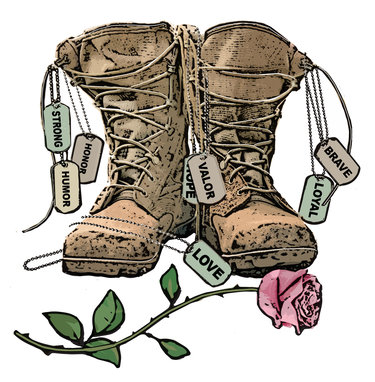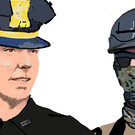Boots on the ground, hearts break at home
Since the war in Afghanistan started 20 years ago, we have written three times about Guilderland families who have lost their sons in that war.
In 2011, we wrote about Specialist Rafael A. Nieves Jr. He was both a fierce soldier and a loving family man. The common thread was loyalty. We learned this from his friends.
The 22-year-old infantryman was killed by enemy fire while on a mounted patrol in Paktika Province.
“He died saving the lives of everyone in our convoy, including mine,” said Private First Class Eric Peterson, who was with Nieves when he died. “We were going through hell on earth and he stayed calm and collected, returning fire at the enemy. He was the bravest man I have ever known and I will miss him very much.”
Nieves had married Sarah, his Guilderland High School sweetheart. She came to his memorial service with their baby son, Rafael, and toddler daughter, Emma. Maureen LaMountain, who had known Nieves at the high school, spoke at his service to Nieves’s wife and children, saying, “You were the inspiration to make him the man he is … He is teaching us to be there for each other.”
In 2013, we wrote about the death of Lieutenant Colonel Todd J. Clark, a career Army leader, and a married father of two. Clark along with another member of the U.S. International Security Assistance Force and a U.S. civilian were killed when a man wearing an Afghan National Army uniform turned his weapon against the ISAF service members.
Schoolchildren lined the street as his hearse rolled by. The funeral was held in the church where Clark had been married, St. Madeleine Sophie. He had been raised in Guilderland, the son of a retired Army colonel.
“He was the only man I knew who was as strong as he looked,” said Clark’s young cousin, Kay-leigh Hicks, at his funeral.
The priest, James Belogi, said, “How quick he was to shine a light on others,” not craving attention for himself, the priest said, exemplifying “that camaraderie” that exists between brothers and sisters of arms.
He concluded, “Our life with Todd is not all in the past … He is cheering us on … to live life with dedication, with honor, with valor and humor, but most of all with love.”
The war was not yet done with striking Guilderland families. In 2014, we wrote of the death of Major General Harold J. Greene. “He was responsible for trying to develop an Afghan army that could stand on its own rather than depend on us,” his father, Harold F. Greene, told us in a podcast in 2019, five years after his son’s death.
The program was to be equivalent to West Point with an important difference since, by Greene’s design, it was to include non-commissioned officers as well. Politicians from countries involved in Afghanistan had gathered for a briefing when a sniper fired three shots, killing Greene and a British officer before he was killed with return fire.
The elder Greene, who sat in on the military investigation, described the attack as “an ambush by someone who was supposed to be sweeping the building for potential problems.”
He also spoke of the crowds his son drew as a Guilderland High School wrestler, of the woman he married when they were both captains, and of his grandson who had gone on to a military career, graduating from West Point.
Each of these families has had to suffer anew with the swift fall of Afghanistan. After 20 years of war, it took just 11 days for the Taliban to sweep across the country and gain control of the capital.
Our former Guilderland reporter, Elizabeth Floyd Mair, had the heart to talk to the fathers of each of these fallen soldiers. She tells their stories on our front page.
It is hard to imagine any pain worse than that of having a child die. But then, added to the grief of these fathers, is now the burden of a lost war.
“The day my son died was the worst day of my life. And this, the world events right now, comes a close second,” said Clark’s father.
“We should be in Afghanistan right now,” said Rafael Nieves Sr.
We can’t argue with a father’s grief but we believe, if 20 years were not enough to establish an Afghan government and army that could stand on its own, staying on would have caused only more American deaths and more grief.
When we talked to Greene in 2019, five years after his son’s death, he chuckled about pleasant memories of his son. He explained the acceptance of his death this way, “You know the circumstances when you put the uniform on … The odds are you will survive; there’s a possibility you won’t. He knew it …,” Greene said of his son. “If you can’t accept it, you don’t belong in the military.”
Greene also said then, “Afghanistan was kind of a rough situation for the United States. We were promoting a form of government that had never been used in that area, in that whole piece of Asia. It was misinterpreted both by the people that were participating in it and the opposition.”
His son’s assignment, he said, “was as much educational, trying to help the Afghans adapt to a form of government that was not familiar to them and showing necessary results at the same time.”
We appreciate that understanding of the war in Afghanistan — that it wasn’t about winning only in the usual sense of dominating an enemy with military might but also involved educating a people about a different way to rule themselves after centuries of tribal allegiances and skirmishing.
This week, Greene told Floyd Mair he was not surprised by Afghanistan’s fall to the Taliban. He noted the country’s instability and said that it could have gone either way.
Greene, who was in the United States Army at “the tail end of World War II,” said he doesn’t see the current Taliban takeover as the end.
“To go back to Europe after World War II, there’s an evolution that brings a country back toward democracy, even after Taliban types of governments take over,” said Greene.
That philosophy replaces bitterness with hope. It is, after all, up to a people to define their own destiny.
It may also be why Greene has escaped the rage that would have consumed many of us were we in his place. Wouldn’t it be natural to be angry at our leaders who put our troops there in the first place, who continued the war for 20 years, and who then bungled our exit, not even ensuring safe passage for Afghans who had helped us?
“I don’t think of anger as a particularly beneficial attitude or approach,” Greene said. “I’d rather back off, try to look at the situation as a whole, and evolve something more worthwhile.”
We also embrace another thought that Greene shared with a surviving son: The United States had had two goals in Afghanistan and one was successful — protecting us at the time from potential attacks at home.
Although the goal of helping build Afghanistan into a stable democracy has for now failed, we here highly resolve that these dead shall not have died in vain.
We believe that Specialist Rafael Nieves Jr. was — as his comrade in arms described him — a hero. So, too, were Major General Harold J. Greene and Lieutenant Colonel Todd J. Clark.
As the mourner said at Nieves’s funeral, “He is teaching us to be there for each other.”
As the father of Greene said, “He was one of those characters who had a lot of interests, and, once he plowed into something, he gave it 100-percent dedication, as required.”
As the priest said at Clark’s funeral, “Our life with Todd is not all in the past … He is cheering us on … to live life with dedication, with honor, with valor and humor, but most of all with love.”
We want the families of these slain soldiers to know we appreciate their sacrifice and their sons’ service to our country. These men continue to inspire us — to be there for each other, to give our all, to live life with honor and love.



